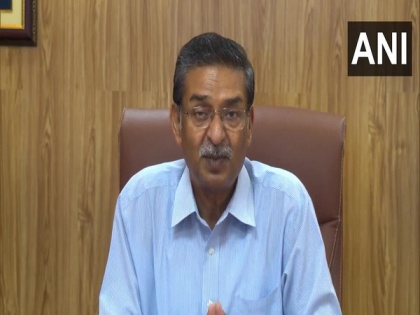Over 1 lakh villages, 71 districts get tap connections under 'Jal Jeevan Mission'
By ANI | Published: July 15, 2021 09:05 AM2021-07-15T09:05:31+5:302021-07-15T09:15:02+5:30
Despite the COVID-19 pandemic, 71 districts, 824 blocks, 50,309 gram panchayats and 1,00,275 villages have tap connections in each house after almost two years of launching 'Har Ghar Jal' mission, said Jal Jeevan Mission Director, Bharat Lal.

Over 1 lakh villages, 71 districts get tap connections under 'Jal Jeevan Mission'
Despite the COVID-19 pandemic, 71 districts, 824 blocks, 50,309 gram panchayats and 1,00,275 villages have tap connections in each house after almost two years of launching 'Har Ghar Jal' mission, said Jal Jeevan Mission Director, Bharat Lal.
At the launch of this ambitious programme on August 15, 2019, by Prime Minister Narendra Modi, out of 18.94 crore rural households in the country, only 3.23 crore (17 per cent) had tap water connections. Today tap water supply has reached to 7.72 crore (40.77 per cent) households, read an official statement.
States including Goa, Telangana, Andaman and Nicobar Islands and Puducherry have achieved 100 per cent tap water supply in rural areas.
"To achieve this mammoth goal of providing tap water supply to every rural household in a short period of five years, Rs 3.60 lakh crore have been allocated by the government. In 2020-21 an amount of Rs 11,000 crore was allocated for the States/ UTs. For 2021-22, that is, the current financial year a four-fold increase in fund allocation has been approved by the Union Minister Jal Shakti, Gajendra Singh Shekhawat so that there is no dearth of fund requirement to achieve the goal. In just three months, Rs 8,891 crore has been drawn by the States/UTs based on the fund utilization and requirement proposed under their Annual Action Plans (AAPs)," it said.
In 2021-22, Rs 26,940 crore has been allocated to States as 15th Finance Commission tied grant for water and sanitation to Rural Local Bodies/ PRIs. There is assured funding of Rs 1,42,084 crore for the next five years i.e. up to 2025-26. This huge investment in rural areas across the country, will accelerate economic activities and boost the rural economy. It will create new employment opportunities in villages, as per the statement.
Under Jal Jeevan Mission, water-scarce areas, quality-affected villages, Aspirational districts, SC/ ST majority villages and Saansad Adarsh Gram Yojna (SAGY) villages are prioritized for providing tap water supply. During the last 23 months, tap water supply has increased four-fold from 7 per cent to 33 per cent in 117 Aspirational districts. Similarly, more than 97 lakh households have been provided with tap water supply in 61 districts affected by Japanese Encephalitis- Acute Encephalitis Syndrome (JE-IES). 696 SAGY villages and 29,063 SC/ST majority villages have become 'Har Ghar Jal.'
The release further stated that in order to ensure safe tap water to children in schools, ashramshalas and anganwadi centres in the country, Prime Minister announced a 100-days campaign, which was launched by Union Minister Gajendra Singh Shekhawat on October 2 2020. As a result, States/ UTs like Haryana, Himachal Pradesh, Punjab, Gujarat, Andhra Pradesh, Goa, Tamil Nadu, Telangana, Andaman & Nicobar Islands have made provision of tap water in all schools, ashramshalas and anganwadi centres.
So far, 6,76,789 schools (65.7 per cent) and 6,74,611 (59.8 per cent) anganwadi centre across the country have been provided with potable tap water supply in adequate quantity for drinking and cooking mid-day meals, handwashing and use in toilets. Central Government has asked the States/ UTs to ensure that in few months, provision of safe tap water is made in all remaining schools, ashramshalas and anganwadi centres for better health, improved sanitation and hygiene for children.
Water quality monitoring and surveillance activities are being given top priority, for which anganwadi workers, ASHA workers, members of Self-Help Groups, PRI members, school teachers etc; are being trained so that they can test water samples for contamination by using Field test Kits (FTKs). There are 2,015 laboratories across the country. 195 water laboratories have been NABL accredited with improved infrastructure and trained technicians. State are upgrading water testing laboratories and securing NABL accreditation. These labs are open to public so that they can get their water samples tested at nominal cost.
Working in partnership with States, Jal Jeevan Mission is making all efforts to ensure tap water supply of adequate quantity and in prescribed quality on a regular and long-term basis to every rural household in India by 2024, read the statement.
( With inputs from ANI )
Disclaimer: This post has been auto-published from an agency feed without any modifications to the text and has not been reviewed by an editor
Open in app